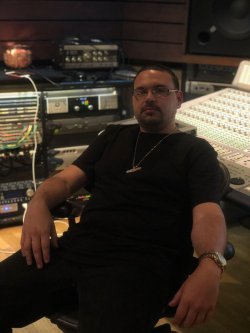How To Make It In The Music Business – 5 Golden Rules From 5 Industry Insiders
5 Bloomfield College alumni — including Grammy-winning creatives and indie label co-founders — break down the 5 rules that every aspiring music professional should know
Posted in: Homepage Announcements

What does it really take to build a successful music career in today’s digital-first, AI-influenced, constantly evolving industry?
We asked five insiders — a Grammy-winning songwriter, a Grammy-nominated producer, a Grammy-nominated engineer, and two independent label co-founders — for their unfiltered take. Here’s what these Bloomfield College alumni think it really takes to not just break into the business — but stay in.
Rule #1: Stop Chasing Views and Virality
Nowadays, we are constantly bombarded with images of artists “blowing up” and finding overnight success. So it’s easy to believe that all it takes to build a successful music career is going viral — and if you don’t, there’s no chance for you. But according to our pros, there’s a lot of value in the slow burn.
“People want to go viral and they want millions of people to pay attention to the content they create. As opposed to something as simple as, ‘I’ve got 1000 listeners, I’ve got 500 listeners,’” says Micheal Williams ’07, a Grammy-nominated music producer and engineer who’s worked with artists like Bryson Tiller, Drake, and Mya. “If you were to go back 30 years in time, no one listened to a demo. You wouldn’t have 500 anything. So it’s all about capitalizing on your audience by engaging with them and creating a tribe of people that really rock with you.”

Instead of chasing a viral moment, focus on building a real, genuine relationship with your audience. Grow slowly. Appreciate and feed every individual fan. That’s how you grow and last.
And going big isn’t the only way to win. Corey Morgart ‘18, co-founder of independent label Space Hound Records, points out that many underground artists are thriving, even without mainstream recognition.
“They’re very niche, but they have a following,” says Morgart. “There are artists who have played Madison Square Garden that you’d never hear on Z100.”

The key? Community building. “At the end of the day, people want to follow people,” says Therese Sheridan ‘19, ‘23 MA (Montclair), co-founder of Space Hound Records. “It’s so important to tell your story. People want to relate to the messages you’re sharing.”
Rule #2: Stay Tapped Into The Culture — Online and Off
Social media is powerful, but not because it exists in a vacuum. It reflects what’s happening in the world — in politics, in pop culture, and in people’s real lives. The artists who break through are the ones who listen first. They’re not just online to post their songs — they’re observing. They’re paying attention to what people care about, what conversations are bubbling up, and how communities are shifting. And they reflect that in their music.
But culture isn’t just fuel for inspiration — it’s also the vehicle that spreads music to new audiences.
“Social media is the new MTV, TRL, BET, 106 & Park,” says Al Sherrod Lambert ‘08, a Grammy-award winning songwriter who has penned hits for stars like Coco Jones, Fantasia, and Ariana Grande.
The magic of social media is that listeners don’t have to be actively searching for a song to discover it. Memes, viral moments, and cultural phenomena carry songs into people’s lives — whether they’re looking for them or not.
“Usually, when something goes viral, new music finds its way into your ecosystem,” explains Lambert. “If you’re looking at political posts, you might come across Jasmine Crockett, a politician, doing the Kendrick Lamar dance to “Not Like Us.” So you don’t have to be searching for Kendrick Lamar’s “Not Like Us” to come across the song.”
Songs don’t just go viral out of nowhere — they move with the culture. The artists who stay tapped in, reflect the moment, and understand where their voice fits in are the ones who break through the noise.
Rule #3: Comfort Zones Don’t Make Classics
A lot of up-and-coming artists are afraid to step outside of the box. For some, it’s the fear of losing a brand-new fanbase or the industry’s backing. For others, it’s a lack of confidence. And sometimes, it’s the pressure to replicate what is already out there — chasing trends because they think it’s what the world wants to hear.
“I work with a lot of young artists, and I can tell if they’re going to be successful or not based on if they’re willing to try things they’re not used to,” says Lorenzo Cardona ‘11, a Grammy-nominated audio engineer behind Post Malone’s hit single “Rockstar.” “That’s one of the things that makes artists stand out — when you’re able to be comfortable with being uncomfortable.”

Innovation is what separates the good artists from icons. The artists who take risks and push past their comfort zones are the ones who are memorable for decades — even centuries.
Of course, that’s easier said than done. With any creative risk, there’s always the chance of backlash. But for our pros, that’s a risk worth taking.
“We need to let go of the fear of the response,” says Williams. “Don’t do it for the particular outcome. Have a commitment to the work — but don’t be attached if no one likes it.”
Rule #4: Use Technology as a Tool, Not a Crutch.
Autotune and AI tools have made creating music easier than ever. The barrier of entry is lower, and more music is being released into the marketplace every day.
But with that ease comes saturation, especially in a streaming-first era. Artists today aren’t just competing with a flood of new music — they’re also up against every great song ever made.
“We have the best record collection that anybody ever had, right on our phones,” says Lambert.
So, how can a new artist stand out in such a crowded space? According to our pros, it comes down to putting in the work to be the absolute best at your craft.
“These new artists don’t practice as much as they should. They rely heavily on the technology we have now that can make them sound better,” says Cardona. “The top tier artists might use technology, but they don’t rely on it.”
If technology has made it easy for just anyone to become a musician, raw talent, skill and hard work now matter more than ever. The artists who truly put in the work — the ones who are intentional and relentless about their craft — are the ones who will stand the test of time.
“Only the cream of the crop rises to the top,” says Williams. “That microwave way of making music — we’re not doing that anymore.”
Rule #5: Your Network Is Your Net Worth
In the music industry, talent and skill will take you far — but relationships can take you further. One meaningful connection can open doors, change your career, and completely shift the trajectory of your life.
“I don’t get to Ariana Grande unless I meet Harmony Samuels,” says Lambert, the Grammy-award winning songwriter behind Ariana Grande’s “The Way” feat Mac Miller. “I don’t meet Harmony Samuels unless I know Natalie Prospere, who I met being part of the resident advisor staff at Bloomfield College as a student. We both were two RAs in our sophomore year. So, that literally has changed my life and my career in the music industry. Someone I met while we were both students at Bloomfield.”

Every relationship matters. Whether it’s someone you meet in school, at a job, or at a random event, you never know who is going to be a part of your journey.
Studying Music Technology at Bloomfield College of Montclair State University doesn’t just teach you how to produce music — it connects you to a community of like-minded students who are all chasing the same dream. You never know where you or your classmates might end up — or what doors you may open for one another down the line.
With a strong and accomplished alumni network, Bloomfield College of Montclair State University has produced artists, producers, engineers, and talent managers who are actively making waves in the music industry today. How will you make your mark?
Are You A…
Prospective Student? Learn more about the Music Technology program at Bloomfield College of Montclair State University, plan a visit to our campus, and take the first step toward applying to become a Bloomfield Bear.
